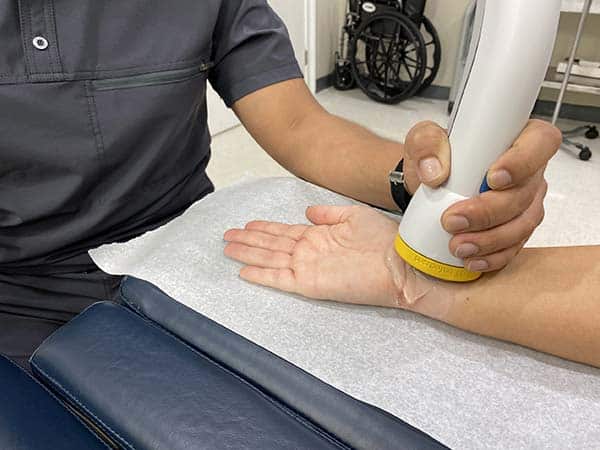

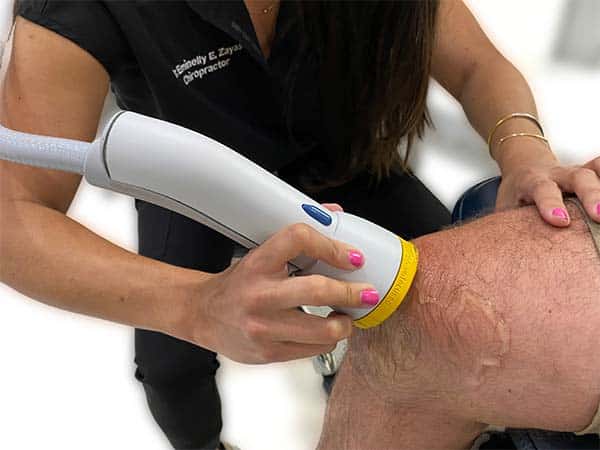
From serious sports injuries causing tissue damage to bone issues and stiffness that comes with age, living with pain is, well, a pain. But it's more than that - it's a stressful, often upsetting way to get through your day, month, and year. Have you ever tried to get out of bed with sore, stiff knees? Most folks would rather just get back in bed. Think you might try exercising with plantar fasciitis? Don't plan on running far or doing cardio for very long. Torn rotator cuff? Without proper treatment, your life might not ever be the same.
Living with pain and the inevitable issues that come with age can seriously affect your wellbeing and happiness. Sure, you could wake up every morning and rely on addicting medications to help you move. Or, you could risk further injury and damage with invasive surgeries that require long periods of recovery and downtime. But those can't be the only two options for treatment, can they?
Fortunately, a new, natural, non-invasive treatment for pain is revolutionizing the medical industry and transforming people's lives. It's giving athletes, average folks, and people of a certain age a reason to be hopeful. It's called Softwave therapy, and unlike many fly-by-night medications and sketchy treatments, it's backed by science and provided by Elite Healthcare Physical Medicine.
If you're barely making it through the day suffering from chronic pain, this FDA-approved drug-free treatment may be for you. Softwave therapy has already been used by thousands of people around the country living with issues like shoulder pain, knee pain, and plantar fasciitis. You could be next.
Though its popularity has only grown in recent years, Softwave therapy - also known as shockwave therapy - has been around for years. In fact, the first systematic study into the benefits of shockwave therapy took place way back in 1950. So, what is Softwave therapy?
Softwave therapy is a method of treatment that works incredibly well for mobility rehab, pain relief, and full-body recovery, usually from chronic pain or injuries. Softwave therapy uses a device emitting low-energy soundwaves that target a patient's injured area. These low-intensity waves boost blood flow and kickstart your body's natural healing processes, relieving long-term pain and helping your body to heal a wide range of injuries and conditions.
The main targets in the body include bones, tendons, and other soft tissues, which are encouraged to regenerate and repair via the shockwaves. Often, shockwave therapy is used in conjunction with other non-invasive treatments like chiropractic care, which we offer at Elite Healthcare Physical Medicine. The results are often incredible, leaving patients wondering why they never tried Softwave therapy before.
Softwave therapy works especially well for:

Better Blood Flow

Collagen Stimulation

Reducing Inflammation

Kickstarting cell growth and healing factors

Breaking down build-ups of calcium
With FDA clearance, little-to-no side effects, and quick application time, Softwave therapy is a welcome alternative for people suffering from pain. Who wants to spend weeks or months recovering from a surgery that might not even work? Likewise, who would want to become dependent on over-the-counter or, even worse, prescription pain meds? Living a life of addiction is a road nobody wants to go down.
Softwave therapy represents a revolution in non-invasive pain treatment; best of all, it's highly effective. Independent studies prove that shockwave therapy helps with pain. 65-91% of patients using shockwave therapy experienced real-deal improvements in damaged muscle and bone tissue, solving their mobility problems and drastically reducing pain. It almost sounds too good to be true, but as many patients at Elite Healthcare Physical Medicine will tell you - it isn't.
Book AppointmentSome of the most common conditions that Softwave therapy treats include:









When you get up in the morning and go to the bathroom to brush your teeth, do you notice a stabbing, sharp pain near your heel? Does the pain go away once you have a chance to walk around? If so, you could have plantar fasciitis. According to the American College of Foot and Ankle Surgeons, this painful condition is quite common. About two million people suffer from plantar fasciitis every year, and almost 10% of all people will experience the condition at least once in their life.
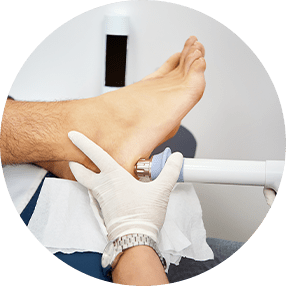
This common foot issue happens when the plantar fascia - a fan-shaped tissue near your heel - gets inflamed. The plantar fascia is a thick strip of connective tissue that links your toes to your heel bone, helping to preserve the arch of your foot. When this band is strained, it causes intensely sharp pain, usually in the morning when you wake up and plant your feet on the floor.
Most folks ignore plantar fasciitis because the pain eventually goes away throughout the day. However, if left untreated, plantar fasciitis can lead to weakness and chronic pain, which may affect daily walking.
Some causes of plantar fasciitis include:
The short answer to this question is not really. Patients with plantar fasciitis will ice the affected area with little-to-no relief since they spend so much time on their feet. It's hard to rest an achy heel if you've got a job that requires you to be on your feet. Anti-inflammatory meds like Advil don't work all that well, either. They may provide temporary pain relief, but in terms of a long-term solution, taking these drugs will cause major side effects.
Book AppointmentWhen more conservative treatment options like ice and over-the-counter meds don't work, most doctors turn to ultra-expensive orthotics, steroid injections, or invasive surgery. For the average person, those options fail on all fronts, as they carry risks for side effects and may even cause the issue to worsen.
Instead of going under the knife or changing their daily routines, many people suffering from plantar fasciitis are turning to Softwave therapy for relief.
During a shockwave therapy session, our expert providers use a special probe to deliver pressure waves to inflamed tissue. These waves trigger natural healing processes causing new blood vessels to form. In turn, oxygen is supplied to the affected area, reducing inflammation and causing healthy cells to regenerate. Shockwave therapy also produces collagen, which is crucial for connective tissue health.
With just a few visits, many patients find long-term relief from plantar fasciitis without relying on strange drugs or harmful surgeries.
Living with knee pain is just miserable. From knee tendonitis to osteoarthritis, knee pain can prevent you from enjoying activities and affect your day-to-day life. Your knee is a joint comprised of cartilage, bone, ligaments, and fluids. Tendons and muscles within the knee help the joint move. When one of these crucial knee structures is hurt or compromised, it results in knee pain and long-lasting knee problems. This, in turn, leads to difficulty walking at best and debilitating knee issues at worse.
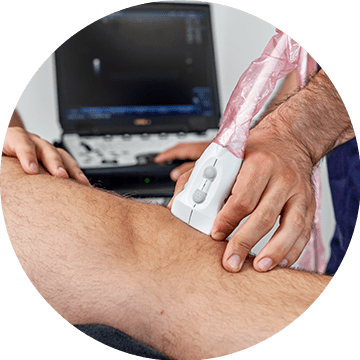

If you're an active person or somebody who plays sports often, you're probably all too familiar with knee pain - especially common conditions like patellar tendinopathy. Also called "jumpers knee," this issue happens at the patellar tendon, which is found on the front of the knee just under the knee cap. When living with this condition, most patients experience pain around the kneecap or lower down on the leg around the tibia.
In addition to injuries and issues like jumper's knee, everyday wear and tear will cause knee pain over time. With time, this knee pain can develop into arthritis. If your knees are swollen, painful, or stiff, you may have arthritis in your knees. Regardless of the kind of knee pain you're experiencing, treatment options have been limited to agonizing surgeries and addicting pain medications. But that all changes with shockwave therapy for knee pain in Awendaw, SC.

Though no two knee pain problems are exactly the same, shockwave therapy has been shown to be highly effective for knee pain. In fact, many patients at Elite Healthcare Physical Medicine find relief after just one session. Many times, sessions can be completed in as little as 30 minutes. So if you want to find relief for knee pain on your lunch break, that's definitely possible.
As is the case with plantar fasciitis, Softwave therapy works by sending sound wave and low-energy impulses to the affected area of your knee. These pulses stimulate your body's healing factors, which can help regenerate and repair damaged tendons and tissues. Softwave therapy for knee pain is especially promising for people who have tried other treatments - like surgery and pain meds - with disappointing results.
Benefits include:
Several studies and reviews prove that Softwave therapy can be very beneficial for people suffering from knee pain problems like jumper's knee. A study involving 66 patients with knee pain found that they enjoyed a significant improvement in their reported pain levels with Softwave therapy. In fact, knee pain was reduced by nearly 50% after a single month. When combined with other regenerative and physical therapy treatments at Elite Healthcare Physical Medicine, your days of living with knee pain are numbered.
Book AppointmentHere's a fact for you to consider: Every joint that you have in your body plays a part in your day-to-day life. But when we think of joint issues, we typically jump to knee issues. However, your knees aren't the only joints in your body to go through wear and tear. Your shoulders experience just as much, if not more, wear and tear than your knees. We put a strain on our shoulders just about every time we use or move our arms. Our shoulders play a pivotal part in living a normal life. When they begin to deteriorate over time due to age or overuse, it creates a litany of painful problems.
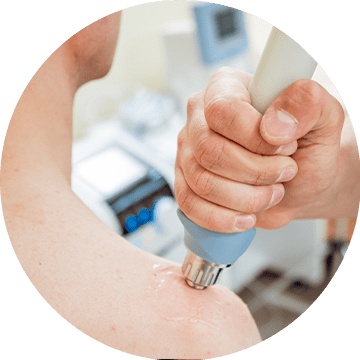

There are many causes of shoulder pain, like deterioration, inflammation, and trauma. Of the many painful shoulder conditions affecting Americans yearly, rotator cuff tendonitis and arthritis are very common. Also called calcific tendinitis, rotator cuff pain is caused by built-up calcium deposits on the shoulder's tendons, which connect your rotator cuff to nearby muscles and bones. This painful condition is usually linked to sports, like basketball and volleyball, or in professions requiring repetitive movements, like in the plumbing industry.
Some common symptoms of shoulder pain and rotator cuff tendinitis include:
Though strengthening exercises and some medications provide temporary relief for shoulder pain, they're not meant as long-term solutions. Luckily, Softwave therapy for rotator cuff pain in Awendaw, SC, can help.
Shockwave therapy has been shown to work wonders for shoulder pain. Low-intensity shockwaves break up calcium deposits and jumpstart your body's healing processes, stimulating blood flow and healthy cell growth. Shockwave treatment is especially effective for long-term shoulder pain since it releases stem cells, sends growth factors to the affected area, and boosts capillary production. Shockwave therapy has also been shown to break down scar tissue and eliminate trigger points, all of which decrease shoulder pain. This relief is most often long-lasting, unlike other treatments like medications and injections.
Many studies support the efficacy of Softwave therapy for shoulder conditions like rotator cuff pain and calcific tendonitis of the shoulder. In a study of 84 patients living with long-term rotator cuff tendonitis, participants in the treatment group saw a significant decrease in the intensity of their shoulder pain. Another study related to shockwave therapy for calcific tendonitis found that 86.6% of patients experienced fewer calcifications.
If you're having to live with rotator cuff pain or another type of shoulder issue, choosing Softwave therapy may be your best course of action.
Book AppointmentWhether you're sick of living with intense heel pain from plantar fasciitis, the mobility issues associated with knee pain, or the day-to-day struggles of rotator cuff degeneration, you'll find hope at Elite Healthcare Physical Medicine. Unlike some medical clinics, our team of doctors and specialists focus on an integrative, multidisciplinary approach to healing. Instead of relying on addictive medications and invasive surgeries, we prefer to address the underlying causes that our patients face.
We combine several all-natural pain relief therapies so that your shoulder pain, knee pain, joint pain, and foot pain go away for good. We resolve pain by using healing treatments that restore function and improve mobility for the long term. Our state-of-the-art regenerative medicine treatments, used hand-in-hand with proven chiropractic techniques, will stimulate your body's healing power from within. If your pain is related to muscles, nerves, and bones, our doctors can help you overcome discomfort, injury, or medical conditions affecting these systems.
If you've been unable to resolve your pain or have become dependent on painkillers to cope, Softwave therapy may be the natural solution you need. It all starts with a quick call to our office, so we can begin to understand your needs. When you come for your first visit, our doctors will find the personalized treatment you need so that you can manage your pain in a non-invasive and drug-free environment manner.
Book AppointmentThe town of Awendaw was incorporated more than three decades ago, not so much to provide municipal services but to let residents control their planning and zoning decisions rather than relying on county government. In recent years, however, that job has become increasingly challenging because Mount Pleasant is running out of large developable sites, our region’s continued growth is creating dramatic demand for more housing and Awendaw’s location helps it retain much of its rural charm, wedged as it is between two environmental tr...
The town of Awendaw was incorporated more than three decades ago, not so much to provide municipal services but to let residents control their planning and zoning decisions rather than relying on county government. In recent years, however, that job has become increasingly challenging because Mount Pleasant is running out of large developable sites, our region’s continued growth is creating dramatic demand for more housing and Awendaw’s location helps it retain much of its rural charm, wedged as it is between two environmental treasures of national significance: the Cape Romain National Wildlife Refuge and the Francis Marion National Forest.
It’s more important than ever that town officials recognize the growing importance and intensity of their planning work — and rise to the occasion to protect the relaxed, rural ambiance that has defined this part of South Carolina’s coast.
There are some encouraging signs.
A year ago, we lamented proposals to develop two large subdivisions, with 249 and 204 homes respectively, to be served by individual septic tanks since there are no sewer lines in the town. Those are still in the permitting stages and we hope they will be scaled back if they’re built at all. They certainly underscore the need for state regulators to consider the cumulative impact of large subdivisions with dozens, even hundreds, of septic tanks that can compromise nearby waterways, as they have done along Shem and James Island creeks.
But the encouraging news is when yet another septic-tank subdivision was proposed recently, the Awendaw Planning Commission voted unanimously against Sewee Landing’s 72 homes on 50 acres. At the same meeting, the commission recommended an update of the town’s planned development ordinance that these subdivisions had relied on.
Awendaw Town Council could consider both the subdivision proposal and the ordinance rewrite as early as this week, and we urge council members to follow their planning commissioners’ advice.
Even when a septic system is well-maintained, it can face problems if the water table is too high, and rising groundwater can carry the resulting contaminants to rivers and marshes, a problem that’s expected to grow more acute as climate change pushes sea levels higher. Awendaw’s proximity to the pristine Cape Romain makes it a desirable place to live, but too many septic tanks too close to the refuge (and too close to each other) could taint the very thing that makes the area an attractive place to visit and to live.
These developments don’t pose a threat simply because they would rely on septic systems. They also would increase the amount of impervious surface and stormwater runoff, exacerbate habitat loss and degrade the community’s rural character.
Awendaw is a small town that seems to have been pushed around at times. Its deal for a new park to be created by then-Charleston County Councilman Elliott Summey in exchange for Mr. Summey’s right to mine dirt on the park site ended badly. The mining stopped in 2019, but the town had to sue to try to get an accounting of what was done there; the park itself is still a distant dream. In another part of town, the King Tract mine was allowed to expand even though it had been hit with more than a dozen water quality violations.
So we’re encouraged that there’s a proactive solution in the works. Awendaw is drafting a new comprehensive plan to replace one that’s 13 years old. This process will provide town leaders, residents and others a perfect chance to forge a shared vision of how the town should manage growth, and they should make sure they make the most of this chance.
After all, the pressures on their town are only expected to intensify in the years to come.
Click here for more opinion content from The Post and Courier.
AWENDAW, SC (WCIV) — For weeks, Awendaw residents have been expressing concerns about the potential of hundreds of new homes coming to their community."Town council has approved 822 new residences with more on the docket tonight," Awendaw resident John Cooke said. "Those residences come with a population that will at least double our current population."Read more: ...
AWENDAW, SC (WCIV) — For weeks, Awendaw residents have been expressing concerns about the potential of hundreds of new homes coming to their community.
"Town council has approved 822 new residences with more on the docket tonight," Awendaw resident John Cooke said. "Those residences come with a population that will at least double our current population."
Read more: Awendaw residents fear housing boom could threaten town's rural charm
However, Mayor Miriam Green says the population will not be doubled.
"It's not the truth," Green said. "It's not a total of 800 homes. And if it is, they still have to go through planning."
"I can't say it's 800, 9,00, or 1,000 homes because I don't know," she continued. "But in the preliminary plan, yes, it did say certain amount of homes will be built up there."
Green describes the development plans as "smart growth".
Mayor Miriam Green describes the development plans as "smart growth". (WCIV)
"We are following ordinance and processes of procedures and state guidelines," she said.
In response to the concerns about the development plans being too much in too little time, Green says the town has to follow guidelines and the rules.
"Just because someone comes to you and says 'This is what we want,' doesn't meant that's what the majority of the citizens of Awendaw want," the mayor said.
Residents have also expressed concerns about how new developments may affect Awendaw's roads and infrastructure.
Read more: Ten Mile Neighborhood Association challenges proposed approval of development along Seafood Road
"Last meeting, I heard emergency services people talk about the fact that they were concerned about their ability to support the town," Cooke said. "The roads, the infrastructure might not be able to support (new development). The roads that were made in the early 1950s-60s are still the ones being used today and could fail."
Green says the infrastructure, road, and traffic issues are being analyzed as part of the development plans.
"We're looking at all that stuff," the mayor said. "We have a traffic study in place, but it doesn't happen overnight."
Another concern is the septic tanks that will be used for the new development, which Green says the town is working on with the South Carolina Department of Health and Environmental Control (DHEC).
Read more: Zoning denial a 'win' for some Awendaw residents
"20 years when all these systems start to fail, you could have an ecological disaster that could affect a lot of bulls bay and the intercoastal waterways," Cooke said.
The evening of Aug. 21, the Awendaw Planning Commission reviewed the Harper Valley proposal. It was denied in a 5-1 vote.
Cooke says people who live in Awendaw are banding together in opposition and they are asking for a moratorium to slow down the development.
"It's a growing pain in Awendaw," Green said. "It's not the people that live here. It's the people that came here."
The 2023 white-tailed deer archery hunts on Bulls Island, Cape Romain National Wildlife Refuge will be held Nov. 6- 11 and Dec. 4-9. Hunters must possess the required state hunting license. Each hunter will check in and register before setting up camp and hunting. Hunters under the age of 16 must have successfully completed a State approved hunters education course, present a hunter safety certificate and be under the immediate supervision of an adult.On Nov. 5 and Dec. 3 at 4:00 p.m., the Refuge Manager will meet with archers to disc...
The 2023 white-tailed deer archery hunts on Bulls Island, Cape Romain National Wildlife Refuge will be held Nov. 6- 11 and Dec. 4-9. Hunters must possess the required state hunting license. Each hunter will check in and register before setting up camp and hunting. Hunters under the age of 16 must have successfully completed a State approved hunters education course, present a hunter safety certificate and be under the immediate supervision of an adult.
On Nov. 5 and Dec. 3 at 4:00 p.m., the Refuge Manager will meet with archers to discuss refuge hunt regulations.
The camping area on Bulls Island will remain open from 9:00 a.m. on the Sunday preceding each hunt until noon on the Sunday following the hunt. Only registered hunters will be allowed to camp. Water and restroom facilities are the only amenities provided on the island. Overnight parking is permitted at Garris Landing during the archery hunts.
Hunters must provide their own transportation to and from Bulls Island or make transport arrangements with the refuge concession Coastal Expeditions by calling 843-884-7684. Only portable hunting stands that will not injure living trees are allowed. Crossbows, firearms/ammunition, motorized equipment, poison arrows, dogs, nails, wire, paint and flagging are prohibited. Bicycles are allowed for use on service roads. All deer, regardless of sex, must be tagged. One antlered deer and unlimited antlerless deer may be taken. Tags will be provided by Cape Romain NWR.
The archery hunt on Bulls Island assists management in maintaining the deer population at a level compatible with the environment and permits the use of a valuable renewable resource.
Visit the Cape Romain site at www.fws.gov/refuge/cape-romain for a copy of the hunt permit. For additional information, call the Refuge office at (843) 928-3264. Permits are available at the Refuge Headquarters Office Monday – Friday from 8:30 a.m. to 4:30 p.m. and, Wednesday – Saturday, 9:00 a.m. to 5:00 p.m. at the Sewee Visitor and Environmental Education Center, 5821 Hwy 17 North, Awendaw, South Carolina 29429.
The U.S. Fish and Wildlife Service mission is to work with others to conserve, protect and enhance fish, wildlife, plants and their habitats for the continuing benefit of the American people.
Visit the Service website at www.fws.gov for more information on the organization’s work.
Receive Moultrie News promotions directly to your inbox!
By submitting this form, you are consenting to receive marketing emails from: The Post and Courier, 148 Williman Street, Charleston, SC, 29403, US, https://www.postandcourier.com. You can revoke your consent to receive emails at any time by using the SafeUnsubscribe® link, found at the bottom of every email. Emails are serviced by Constant Contact.
AWENDAW, S.C. (WCSC) - The Awendaw McClellanville-Fire Department is celebrating a historic milestone for its team.Firefighter Kohen Etheredge and engineer Isaiah Graham became the district’s first all African-American crew to be assigned to an engine company, last week.“At first like I said we thought it was a joke,” Graham said. “Because Chief just pulls up and he’s like, ‘Hey the big Chief is here.’ And I’m like, ‘Oh somebody probably got in trouble,’ Graham and Eth...
AWENDAW, S.C. (WCSC) - The Awendaw McClellanville-Fire Department is celebrating a historic milestone for its team.
Firefighter Kohen Etheredge and engineer Isaiah Graham became the district’s first all African-American crew to be assigned to an engine company, last week.
“At first like I said we thought it was a joke,” Graham said. “Because Chief just pulls up and he’s like, ‘Hey the big Chief is here.’ And I’m like, ‘Oh somebody probably got in trouble,’ Graham and Etheredge laughed. “We thought we were getting fired.”
Graham has been with the Awendaw-McClellanville Fire Department for about a year and a half, while Etheredge has been there since July. Both were shocked to learn they were making local history just by working to protect the almost 11,000 people of unincorporated Mt. Pleasant.
“We was like, ‘No. No way!’ Graham said. “Yeah it was really awesome. It was. I’m not going to lie. Just to see just now in 2023, it’s kind of crazy to me to think about it.”
They said the staffing move is being well-received in the Awendaw-McCellanville community, which is upwards of 85% African American, according to the department.
“When you hop out of the truck and people see that it’s you, they feel a lot better. They’re like, ‘He looks like me.’ You know, ‘He’s going to take care of me. He knows the terminology that I’m going to use.’ Like they’re in good hands,” Etheredge said.
“I just like being a part of something bigger than me,” Graham said.
Their presence is opening a larger conversation of diverse representation among first responders. Of a crew of 33, the department cites having seven African-Americans, one Latino-American and three women, marking the first time it’s had that many people of color and women working at the same time.
The team includes engineer Ebony Jenkins, who’s been with the department for two years, firefighter Brooke Barr, who’s been with the department for 16 months, firefighter Ethel Mezyck, who’s been with the department for about two months and firefighter Sarah Coker.
“You don’t normally see a lot of females in the service like this,” Coker said. “It’s not as common. So it’s cool to just be one and be able to represent. We can do it just like everyone else can.”
Coker explains much of her work as a firefighter includes fire prevention within the community, giving her a chance to connect with those living in the area.
“It’s also a lot of fun like seeing little girls and they come up and they get excited and they’re like, ‘Oh my gosh! Like a girl is doing this.’ I have a lot of little girls say that before and I take them personally and bring them around in the truck. It’s very nice to be able to do that.”
Chief Shaun Gadsden said representing people from all walks of life was an important element of staffing the department.
“We live in a diverse and we work in a diverse community. And I think it’s important that our department you know reflects our community,” Gadsden said.
As for what the future holds for the Awendaw-McClellanville Fire Department, Gadsden said you can expect more milestones to come.
Copyright 2023 WCSC. All rights reserved.
AWENDAW, S.C. (WCSC) - The Charleston County Board of Zoning Appeals denied a sand mine in Awendaw Monday night after dozens of community members shared their concerns.Twenty-nine letters of opposition were given to the board ahead of the meeting, with dozens of community members attending the meeting, bringing up concerns about nature, roadways, noise and pollution in the rural area.The proposed sand mine would be around three acres of land on Lofton Road and North Highway 17, just 900 feet away from Saint James-Santee Element...
AWENDAW, S.C. (WCSC) - The Charleston County Board of Zoning Appeals denied a sand mine in Awendaw Monday night after dozens of community members shared their concerns.
Twenty-nine letters of opposition were given to the board ahead of the meeting, with dozens of community members attending the meeting, bringing up concerns about nature, roadways, noise and pollution in the rural area.
The proposed sand mine would be around three acres of land on Lofton Road and North Highway 17, just 900 feet away from Saint James-Santee Elementary and Middle School.
One major concern expressed was the safety of the 215 children who attend the nearby school if the mine was approved.
“Our children are this important as anybody else; they closed the only high school we have,” community member Cynthia Gabbice says. “Our children have so many miles to get to Wando back and forth every day, and if this destroys our children, we don’t know what the side effect of them digging holes now.”
Monday night was the second time the board heard the proposal after deferring it.
The proposed sand mine would be a temporary build and would operate 7 a.m. until 5 p.m. from Monday through Friday with seven residential lots 100 feet away from the mine.
“I understand the concern from the school, but the school will not see anything will not hear anything will not smell anything.; and while we’re on smell, let me remind you, this is going to be a wet dig, there’s going to be zero discharge from this operation,” Developers Lawyer, Tommy Goldstein, says.
Being located right by Highway 17, the mine would have brought 40 trucks in and outside of the mine each day.
“Turning lanes in and out right across the street from Saint James-Santee are very short, and there’s a lot of traffic,” nearby resident Teresa Danner, says. “If there are trucks coming and going from any direction in any vicinity, whether it’s another access road or not, that’s a severe danger in my opinion.”
The developers could still appeal the decision made by the Charleston County Board of Zoning Appeals.
Copyright 2023 WCSC. All rights reserved.
